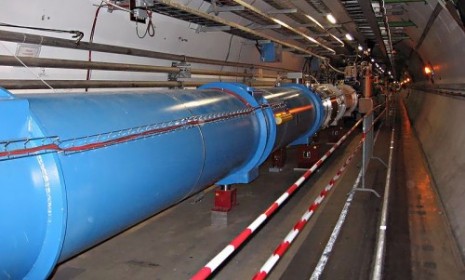What the 'Large Hadron Collider' might do: 6 theories
The Big Bang Machine could potentially create black holes, unveil the mysteries of the universe, or even allow us to time travel

A free daily email with the biggest news stories of the day – and the best features from TheWeek.com
You are now subscribed
Your newsletter sign-up was successful
After two years of delays, the Large Hadron Collider is finally up and running — and hasn't yet destroyed the universe. The 17-mile particle accelerator, based in Geneva, Switzerland, has begun smashing together subatomic particles at near-lightspeed velocities in the search for the "Higgs Boson," an elusive piece of matter also known as the "God particle." But what else will this colossal $9 billion machine do? Here 6 theories of what the Big Bang Machine will accomplish:
1. Kill us all
The "early collisions" in the now-operational LHC might seem to disprove "doom-monger" theories that the machine would create an Earth-devouring black hole, says The Daily Telegraph. But pessimists point out: It's "still only running at half power." Relax, says Professor Stephen Hawking, quoted by the BBC: "Collisions at these and greater energies occur millions of times a day in the Earth's atmosphere, and nothing terrible happens."
The Week
Escape your echo chamber. Get the facts behind the news, plus analysis from multiple perspectives.

Sign up for The Week's Free Newsletters
From our morning news briefing to a weekly Good News Newsletter, get the best of The Week delivered directly to your inbox.
From our morning news briefing to a weekly Good News Newsletter, get the best of The Week delivered directly to your inbox.
2. Reveal new dimensions
String theory — the mathematical idea that the world is made up of "tiny vibrating strings rather than point-like particles" — posits the existence of ten dimensions, according to Plus Magazine. Six are "curled up so tightly that we cannot perceive them." But in a high-energy environment, physicists may be able to detect particles "jumping in and out" of them.
3. Uncover the origins of the universe
In creating "ultra-high energy collisions," says DK Matai in the Huffington Post, "scientists are mimicking the conditions just after the Big Bang" — trillionths of a second after, to be precise. Researchers hope the behavior of particles in this state will shed light on the moment of creation itself.
A free daily email with the biggest news stories of the day – and the best features from TheWeek.com
4. Explain why matter has mass
This is where the "Higgs Boson" comes in, explains the Christian Science Monitor. Scientists are not yet sure what caused subatomic particles (which include quarks, leptons and bosons) to gain mass in the instants after the Big Bang. A scientist named Peter Higgs theorised that an elusive, invisible boson "imparts mass" to them. If the LHC can find evidence of this particle, it will validate Higgs' theories on why matter has mass.
5. Shed light on dark matter and dark energy
Dark matter is "the heavy stuff" that scientists believe makes up around 22 percent of the universe, says Jonathan Fahey at Forbes. It is invisible — neither generating nor reflecting radiation — but the collisions at the LHC are expected to make it detectable. Scientists also want to discover the origins of dark energy, a hypothetical form of energy that makes up 74% of the universe and is somehow "pushing it apart." Finding dark energy is considered a longshot: 12 to 1, according to the Irish bookmaker Paddy Power.
6. Allow us to time travel
If string theory (see above) can be proved, then theoretically humans may be able to travel between these "hidden dimensions" of space and time, says the CS Monitor. Sounds unlikely, but some physicists have hypothesized that a "malign influence from the future" had a hand in delaying the LHC, says Dennis Overbye in the N.Y. Times, travelling back in time because the experiments are "so abhorrent to nature."
Sources: NYT , Plus Magazine , Christian Science Monitor, Huff. Po., Daily Telegraph, Forbes